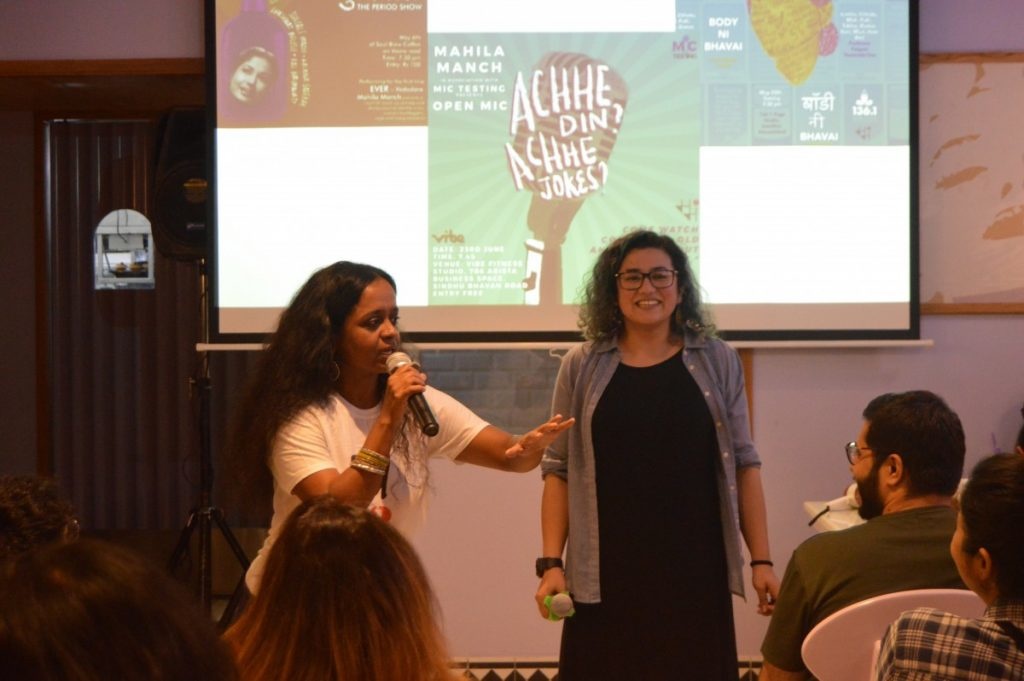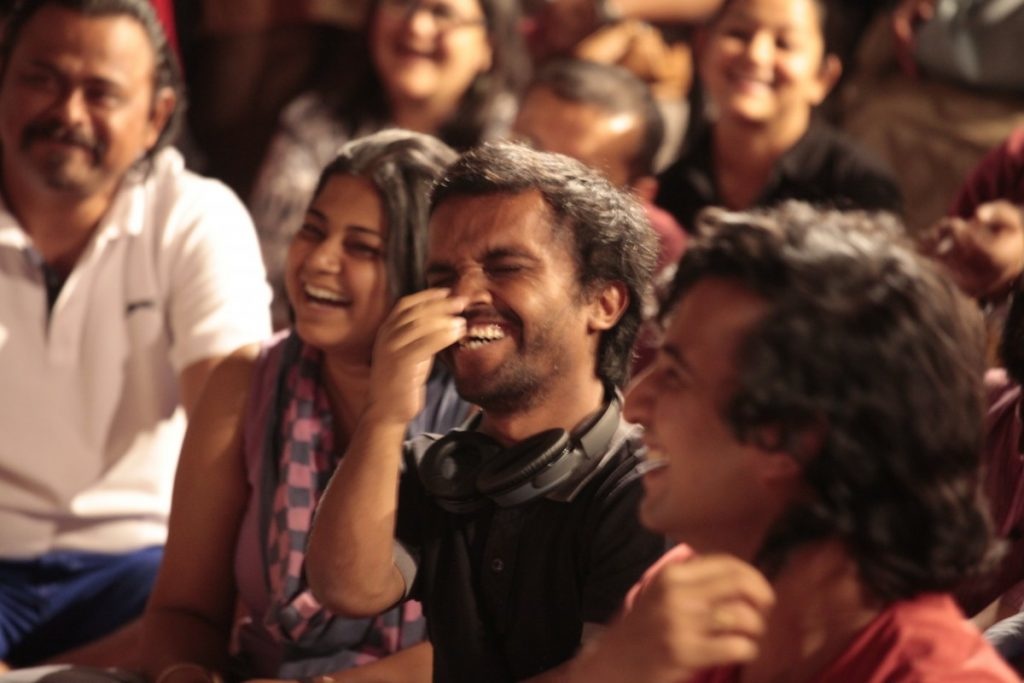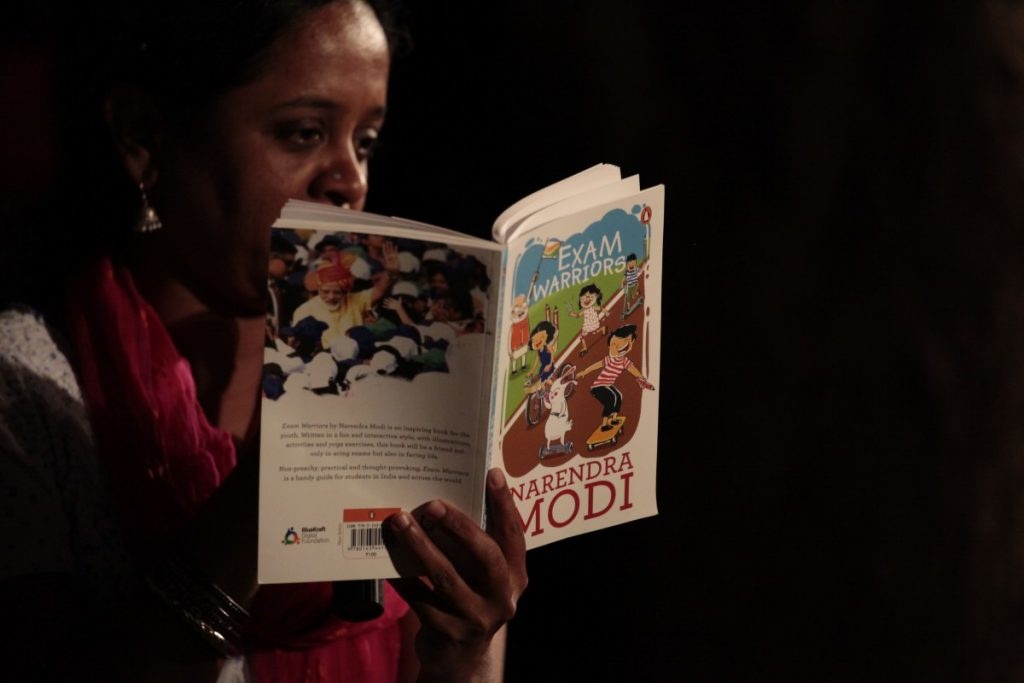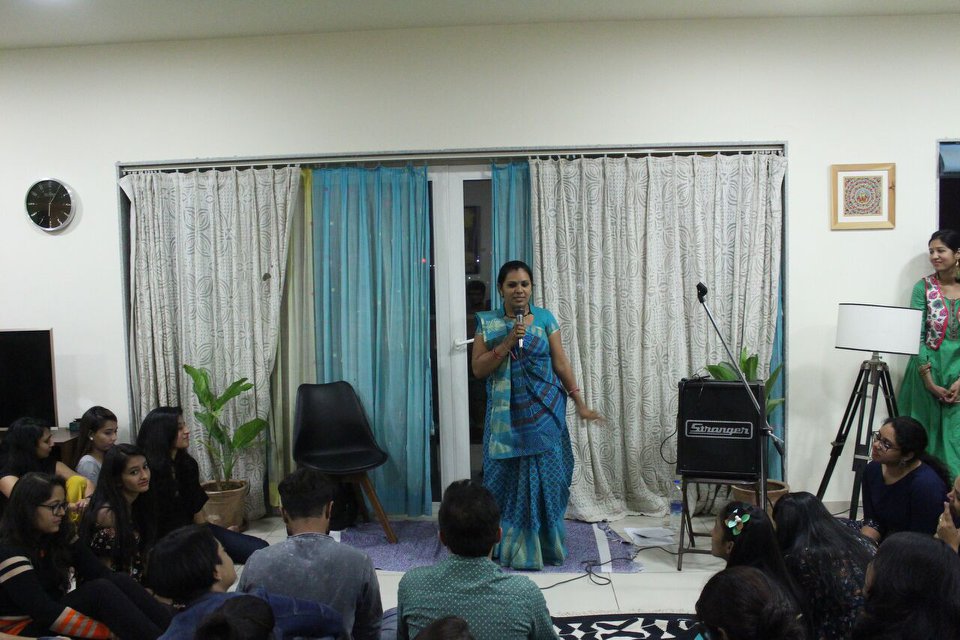Each month, women from Mahila Manch take the stage to highlight issues that affect women.

First published: https://thewire.in/women/how-women-comics-in-ahmedabad-are-using-humour-to-talk-about-real-issues
Once a Month, ‘The Period Show’ Rocks Ahmedabad with Laughs
and Real Talk
Sick of men cracking jokes about PMS and porn, two women realised they could do it themselves – while offering a platform to other kinds in conservative Gujarat
A queue stretches outside a trendy café in the Panjrapole neighbourhood of Ahmedabad. Inside, the crowd sits in hushed excitement. In a few minutes, a motley crew will take the stage.
“Do you know the most searched word on the Internet in India?”
“It’s the word ‘sex’.”
“Achha, ‘Modi’ nahin hai? Fir to ‘chappan inch’ ka matlab chodhai se lambai ho gaya! (It’s not Modi? Then, the bravado associated with a 56-inch chest has more to do with length than girth!)”
Peals of laughter. Few things entertain the average Indian more than sexual innuendo, mixed with a dash of politics – especially during elections. But these are women daring to indulge in some radical humour in conservative Gujarat.
A couple of years ago, Preeti Das and Renu Pokharna met Shefali Pandey at a café. As they chatted, Pandey mentioned how she couldn’t watch desi pornography, because everyone in it looked like family.
After the cackles subsided, the duo let Pandey in on their plan of using stand-up comedy to address real issues around them. They cofounded the Mahila Manch and a few weeks later, faced their first audience of The Period Show.
“It’s a monthly show, periods happen once a month and we have women who are often PMSing, so (laughs) – that’s how we arrived at the name,” Pandey, 34, said a day before their tenth performance called ‘Tu 13 Dekh’.
“Besides, we are sick of men talking about PMS and cracking vagina jokes. If we are the ones who go through all of it, why not just talk about it ourselves,” she adds.
For that first show, the invites were sent out through word of mouth, and the venue was a friend’s home. By the time ‘Threesome’ began, the floor was packed with 70 curious onlookers, who had little idea what to expect from the all-woman crew and a transgender woman, who was there on invitation.
“The lens used to judge women on stage is so weird – most aren’t used to it,” Das, 38, says. “So they go like – ‘Sex ki batein kar rahe hain (They’re talking about sex)’. But we are only talking about some very genuine things that affect us.”
“And these are the same folks who enjoy movies with double-meaning jokes,” she adds.

A former journalist, Das brings in the experiences she gathered while travelling across the country. From watching the mards of Dilli create a collage from kinky magazines, to asking women in rural Vidisha whether they used hair removal cream, it’s all been woven into the scripts about women, sexuality and politics.
They followed up the first show with two others, titled ‘Dheemi Aanch’ and ‘Climax’, which addressed some of the topics considered taboo, especially in the public domain: the effects of popping contraceptive pills like mithai, why there isn’t porn for women, or the flawed design of sanitary pads.
“If Akshay Kumar stands with a sanitary pad, it becomes cool for every man. But only we know how badly it’s designed. Some of them have so much perfume, we don’t even need to tell people we’re having our periods,” Das says, rolling her eyes.
A lot of Amdavadis have been taken aback by the bold content and cocky delivery. Some call them crazy feminists, their content “ashleel”, and their jokes “non-veg”. But that’s hardly stopped them from picking up burning issues such as #MeToo and breaking into their own rendition of “D*ck-tana, D*ck-tana”, based on a Bollywood song that features one of the accused.
Das hasn’t spared her husband or his Gujarati family either. In fact, Pandey’s mother thought it to be “cheap-type comedy”, while her father never came back after a show that included “chacha-chachi sex jokes”.

“You can see that people are uncomfortable – it’s in their eyes,” Das says. “It’s easy to spot the troublemakers and those offended, once you start looking.”
“But they still come. What we’ve realised is that our audiences are okay with being a little uncomfortable,” she adds.
They’ve since been invited to private gigs. That’s where the closet supporters step up with requests, even before the ladies hit the stage – whether tearing apart political parties or demonetisation – since they weren’t able to laugh properly in public.
On occasion, things have gotten nasty, like when Das mentioned her mixed lineage, and the fact that she knows five languages.
“They asked me – ‘To aap kaunsi bhasha main ch*dte ho (What language do you have sex in?)’ I wanted to disappear in that moment, but over time, I’ve realised that men make obscene comebacks. As women, we still find strength in numbers,” Das says.
They have shared their platform to talk about the LGBTQ+ community, ASHA workers, female bootleggers and manual scavengers, all with a laugh at the end. The efforts are rewarding. Their confidence has grown, and they’ve also encouraged others to speak out.
“So what we are trying to do is just not pure entertainment. We want to address a cause and we want voices from the margins,” Pandey says.

Last month, The Period Show has its first male performer: Vasim Habib, a Muslim who spoke about life on the other side of Ahmedabad.
“You must remember that this is Gujarat, where Muslims and Hindus live separately and don’t really hang out together,” Pandey says.
“The thing is, if not me, someone else will have to stand up and educate folks from the community,” Habib, 36, says. “Most have little idea on what life is like in the place where I live, while my own folks need to realise that they need not take offence for anything and everything.”
There’s always that sense of fear of being arrested or harassed by anyone who leaves offended. Recording their acts is a strict no-no. Another time, they had to relocate their show, ‘Acche Din? Achche Jokes?’ to a new venue. It hasn’t stopped them.
“We invited a sexologist who we later realised was extremely sexist, and a priest after Section 377 was scrapped,” Pandey says. “We even tried to do a show with the Karni Sena. If I know what I’m saying, why should I be afraid?”
“Then again, I take the stage each time, just hoping that we can do the next show,” adds Das.
Their audience has only grown. ‘Bevada Gujarat’ had to be performed twice when some 600-odd people showed up. Another time, they talked about body-shaming women, only to have men speak out on the pressure they faced about penis size.
“That was quite a revelation for us and it completely opened up the floor,” Das recalls.
Other stereotypes are hard to break, when a crowd sees women take the stage.
“They seem sensitised, but they’re not. I would rather have a man come up to me and say – ‘Ghoongat pehen le (Wear a veil)’. Then I can attempt a dialogue. Some are men who laugh and say women’s empowerment, and then go beat their wives,” Das adds.
Both Pandey and Das have full-time jobs and do stand-up purely out of passion. They regularly receive text messages from other women asking to join them on stage – this month, a chartered account, a radio jockey and an architect performed with them. They would like to take their shows out onto the streets and mohallas to share with folks from other strata of society.
“Just seeing women in comedy is giving a lot of people hope,”Pandey says. “One of the best compliments we’ve received is that we are changing the way Ahmedabad thinks.”